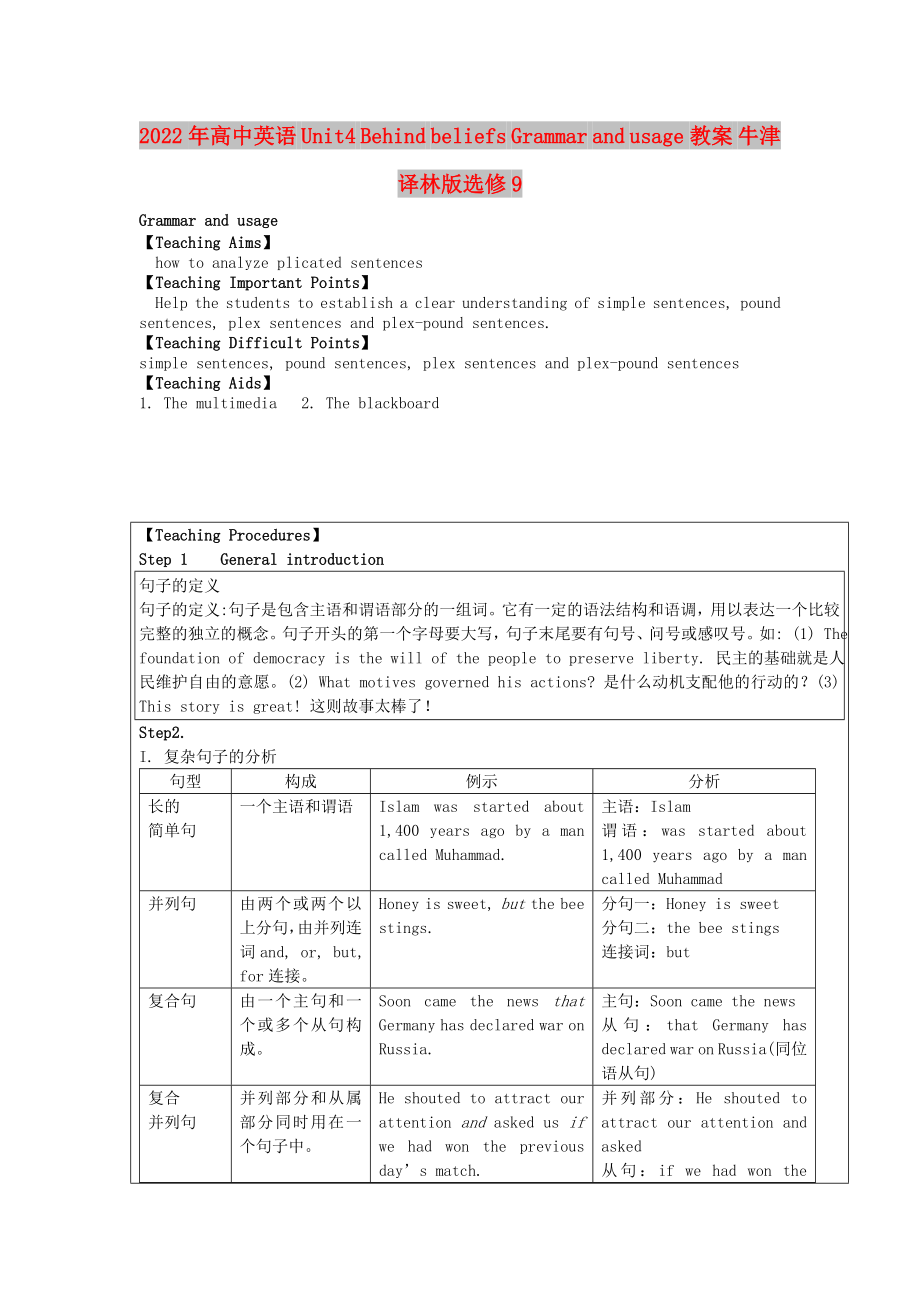《2022年高中英語(yǔ) Unit4 Behind beliefs Grammar and usage教案 牛津譯林版選修9》由會(huì)員分享�,可在線閱讀����,更多相關(guān)《2022年高中英語(yǔ) Unit4 Behind beliefs Grammar and usage教案 牛津譯林版選修9(3頁(yè)珍藏版)》請(qǐng)?jiān)谘b配圖網(wǎng)上搜索。
1���、2022年高中英語(yǔ) Unit4 Behind beliefs Grammar and usage教案 牛津譯林版選修9
Grammar and usage
【Teaching Aims】
how to analyze plicated sentences
【Teaching Important Points】
Help the students to establish a clear understanding of simple sentences, pound sentences, plex sentences and plex-pound sentences.
2�、【Teaching Difficult Points】
simple sentences, pound sentences, plex sentences and plex-pound sentences
【Teaching Aids】
1. The multimedia 2. The blackboard
【Teaching Procedures】
Step 1 General introduction
句子的定義
句子的定義:句子是包含主語(yǔ)和謂語(yǔ)部分的一組詞。它有一定的語(yǔ)法結(jié)構(gòu)和語(yǔ)調(diào)����,用以表達(dá)一個(gè)比較完整的獨(dú)立的概念。句子開(kāi)頭的第一個(gè)字母要大寫��,句子末尾要有句號(hào)���、問(wèn)
3�、號(hào)或感嘆號(hào)��。如: (1) The foundation of democracy is the will of the people to preserve liberty. 民主的基礎(chǔ)就是人民維護(hù)自由的意愿�。(2) What motives governed his actions? 是什么動(dòng)機(jī)支配他的行動(dòng)的?(3) This story is great! 這則故事太棒了�!
Step2.
I. 復(fù)雜句子的分析
句型
構(gòu)成
例示
分析
長(zhǎng)的
簡(jiǎn)單句
一個(gè)主語(yǔ)和謂語(yǔ)
Islam was started about 1,400 years ago by a man calle
4、d Muhammad.
主語(yǔ):Islam
謂語(yǔ):was started about 1,400 years ago by a man called Muhammad
并列句
由兩個(gè)或兩個(gè)以上分句���,由并列連詞and, or, but, for連接。
Honey is sweet, but the bee stings.
分句一:Honey is sweet
分句二:the bee stings
連接詞:but
復(fù)合句
由一個(gè)主句和一個(gè)或多個(gè)從句構(gòu)成���。
Soon came the news that Germany has declared war on Russia.
5��、
主句:Soon came the news
從句:that Germany has declared war on Russia(同位語(yǔ)從句)
復(fù)合
并列句
并列部分和從屬部分同時(shí)用在一個(gè)句子中����。
He shouted to attract our attention and asked us if we had won the previous day’s match.
并列部分:He shouted to attract our attention and asked
從句:if we had won the previous day’s match
II. 簡(jiǎn)單句
6、的基本句型復(fù)習(xí)
句子構(gòu)成
例示
主—?jiǎng)印a(bǔ) (SVC)結(jié)構(gòu)
The man is a teacher.
主—?jiǎng)?(SV)結(jié)構(gòu)
Iron rusts.
主—?jiǎng)印e(SVO)結(jié)構(gòu)
Liverpool won the game.
主—?jiǎng)印e—賓(SVOO)結(jié)構(gòu)
Mary lent me her car.
主—?jiǎng)印e—補(bǔ)(SVOC)結(jié)構(gòu)
We made him our spokesman.
III. 并列連詞的拓展
代表詞
引申的并列詞
例示
and
both … and …, not only … but (also) …, as well as, and …
7���、 as well, not … nor …, neither ... no r…
They can both sing and dance.
She can neither speak nor read French.
or
Whether … or ..., either … or …
Either the president will resign through ill-health, or he will die in office.
but
while, whereas, only
Some of the studies show positive results,
8����、whereas others do not.
I’d love to e, only I have to work.
for
for: 對(duì)前一分句補(bǔ)充說(shuō)明理由或推斷原因�����,只能置于句末����。
The doctor must have sat up all night with his patient, for you see, he looks tired and sleepy.
IV. 復(fù)合句分類復(fù)習(xí)
復(fù)合句匯總
分類
例示
定語(yǔ)從句
限制性定語(yǔ)從句
Those who want to go please sign their names here.
非限制性定語(yǔ)從
9、句
We will put off the outing until the next week, when we won’t be so busy.
名詞性從句
主語(yǔ)從句
Whether he will e or not is unknown.
賓語(yǔ)從句
Please tell me whether or not you agree with him.
表語(yǔ)從句
This is where I don’t agree.
同位語(yǔ)從句
I have no idea when she will be back.
狀語(yǔ)從句
時(shí)間狀語(yǔ)從句
Once
10�、 you object to a man, everything he does is wrong.
原因狀語(yǔ)從句
Now that you are all here, let’s try and reach a decision.
目的狀語(yǔ)從句
We sent the letter by air mail in order that it might reach them in good time.
結(jié)果狀語(yǔ)從句
Bring it near so that I may see it better.
條件狀語(yǔ)從句
As long as we don’t lose heart,
11、we will find a way to overe the difficulty.
讓步狀語(yǔ)從句
Though we fight like cat and dog, we still love each other.
比較狀語(yǔ)從句
She’s no less active than he used to be. (She is as active as he used to be.)
方式狀語(yǔ)從句
He speaks as if there were a frog in his throat.
V. 復(fù)雜句子的分析舉例
復(fù)雜句子
句子分析
That a mi
12�、croorganism is capable of destroying one of another species was first discovered by Paster, who pointed out that this might be put to therapeutic use.
(一種微生物能夠破壞另一種微生物,這種現(xiàn)象最早是巴斯德發(fā)現(xiàn)的��,他指出這可以應(yīng)用到醫(yī)療上去����。)
1. 主語(yǔ):That a microorganism is capable of destroying one of another species(主語(yǔ)從句)
2. 謂語(yǔ): was discove
13���、red
3. 狀語(yǔ): first and by Pasteur
4. 從句: who pointed out that this might be put to therapeutic use(非限制性定語(yǔ)從句修飾Paster.,內(nèi)含that 引導(dǎo)的賓語(yǔ)從句)
Ill and suffering as she was after the inhuman tortures, she yet remained so cheerful and confident, eager to devote the little strength left to her to helping the ot
14�、her rades. (她受過(guò)重刑,而且有病���,可她卻這樣愉快����,這樣充滿了信心�����,這樣用盡她所剩的力量來(lái)幫助其他同志�。)
1. 主語(yǔ): she
2. 謂語(yǔ): remained so cheerful and confident
3. 狀語(yǔ): eager to devote the little strength left to her to helping the other rades. (表示伴隨狀態(tài));ill and suffering as she was after the inhuman tortures.(讓步狀語(yǔ)從句, 兩處狀語(yǔ)均用來(lái)修飾謂語(yǔ)�。)
The present q
15、uestion is that many people consider impossible what is really possible if effort is made. (目前的問(wèn)題是���,很多人把努一把力能做到的事看成是做不到的��。)
1. 主語(yǔ): the present question
2. 謂語(yǔ): is + that 引導(dǎo)的表語(yǔ)從句
3. 在表語(yǔ)從句中:a.主語(yǔ):many people
b. 謂語(yǔ):consider
c. 復(fù)合賓語(yǔ):impossible what is really possible
d. 狀語(yǔ)從句:if effort is made
【作業(yè)布置】
【教學(xué)后記】
 2022年高中英語(yǔ) Unit4 Behind beliefs Grammar and usage教案 牛津譯林版選修9
2022年高中英語(yǔ) Unit4 Behind beliefs Grammar and usage教案 牛津譯林版選修9

